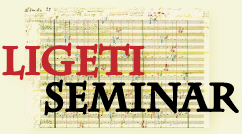Schedule
1) The Early Years; Social and Political context
Introduction to the seminar. A quick and dirty introduction to pc set theory. Ligeti’s early life and works.
2) The Late Fifties: Welcome to the Avant-Garde
Discussion of the readings and analysis. Early life in the West, and exposure to electronic music, Stockhausen, Eimert, etc. Discussion of Glissandi, Artikulation, Volumina, the first two orchestral works. Ligeti’s early lectures at Darmstadt.
3) The Sixties; Darmstadt / Fluxus
Relations to colleagues, emphasis on the voice and theater (Aventures and Nouvelles Aventures, the Requiem and Lux Aeterna), Cello Concerto as “anti” concerto.
4) The Sixties; The Process of Change
Major works of the late sixties, keyboard experiments, multi-movement chamber works, Ligeti attains major prominence.
5) The Seventies; Historicism, Minimalism and the Fantastic
More orchestral works, teaching at Stanford, Le Grande Macabre, short works of the late ‘70s influenced by American minimalism.
6) The Eighties; Old Genres, New Meanings
The shock of the Horn Trio; the first book of the Études pour piano and new choral works.
7) 1985-90; Chaos, Detuning the World
The Piano Concerto and the second book of etudes, influence of chaos theory and African music.
8) 1990-2003; Beyond the Canons of Style
Cross-cultural influences, the Violin Concerto, the Viola Sonata, the late works.
Weeks 9 and 10: Reception history, Class Presentations
Assignments
1. Analyze for April 14
Éjszaka (Night) for mixed chorus (1955)
Questions here.
2. Analyze for April 30
Form in Atmosphéres
Questions here.
3. Analyze for May 14
10 Pieces for Wind Quintet, No. 3, (1968)
Questions here as Word doc. As pdf
4. Analyze for May 21
Passacaglia ungherese for harpsichord (1978)
Questions here as Word doc. As pdf
5. Final assignment for May 28
Choose one of the following piano etudes and discuss it in approximately 300-500 words; touch on pitch/harmonic structure, rhythm, and any other features you find notable: First book, Nos. 2, 3, 4, 5; Second book, Nos. 10, 11, 12, 13, 14; or anything from the third book.
 print
print
